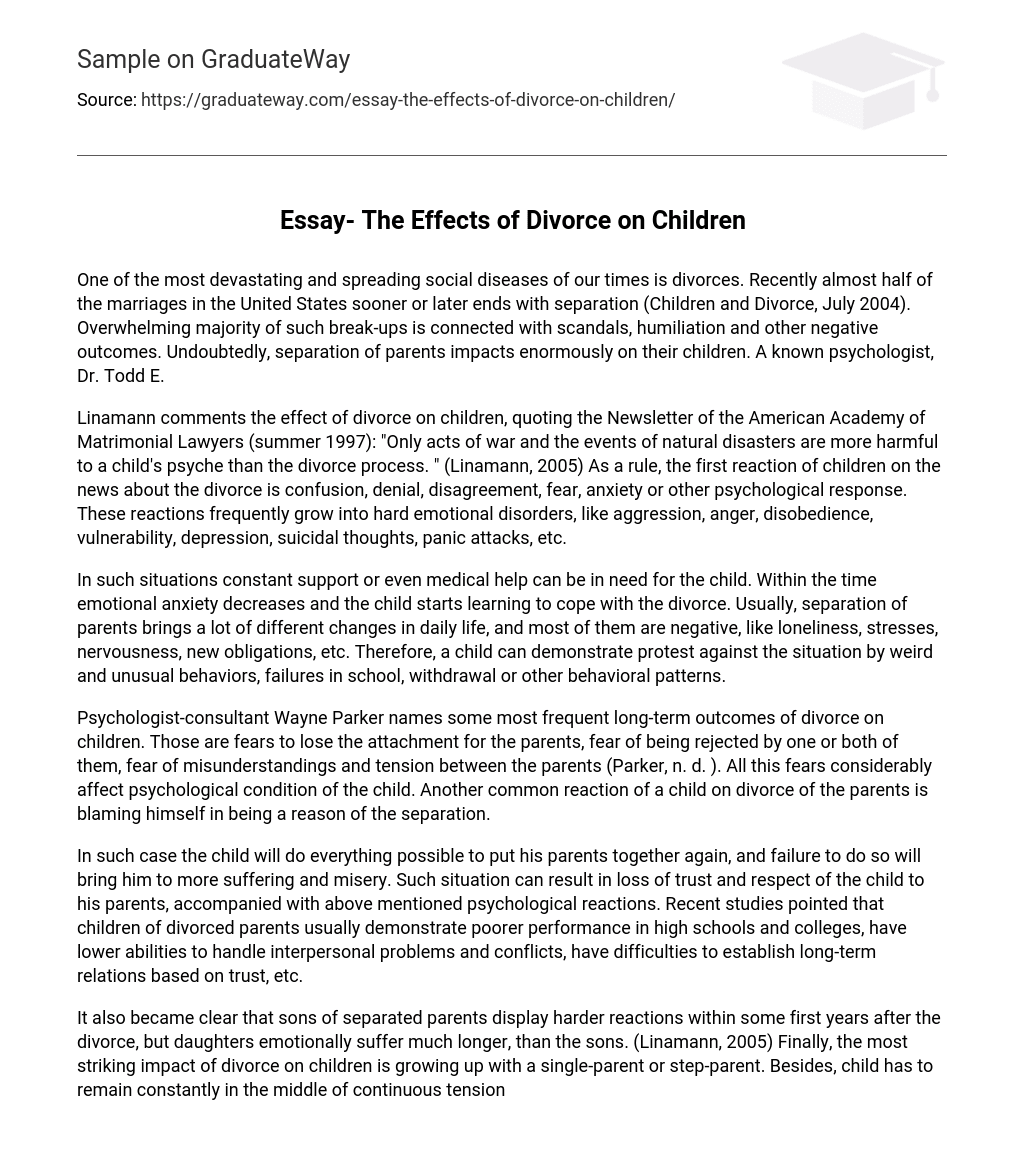One of the most devastating and spreading social diseases of our times is divorces. Recently almost half of the marriages in the United States sooner or later ends with separation (Children and Divorce, July 2004). Overwhelming majority of such break-ups is connected with scandals, humiliation and other negative outcomes. Undoubtedly, separation of parents impacts enormously on their children. A known psychologist, Dr. Todd E.
Linamann comments the effect of divorce on children, quoting the Newsletter of the American Academy of Matrimonial Lawyers (summer 1997): “Only acts of war and the events of natural disasters are more harmful to a child’s psyche than the divorce process. ” (Linamann, 2005) As a rule, the first reaction of children on the news about the divorce is confusion, denial, disagreement, fear, anxiety or other psychological response. These reactions frequently grow into hard emotional disorders, like aggression, anger, disobedience, vulnerability, depression, suicidal thoughts, panic attacks, etc.
In such situations constant support or even medical help can be in need for the child. Within the time emotional anxiety decreases and the child starts learning to cope with the divorce. Usually, separation of parents brings a lot of different changes in daily life, and most of them are negative, like loneliness, stresses, nervousness, new obligations, etc. Therefore, a child can demonstrate protest against the situation by weird and unusual behaviors, failures in school, withdrawal or other behavioral patterns.
Psychologist-consultant Wayne Parker names some most frequent long-term outcomes of divorce on children. Those are fears to lose the attachment for the parents, fear of being rejected by one or both of them, fear of misunderstandings and tension between the parents (Parker, n. d. ). All this fears considerably affect psychological condition of the child. Another common reaction of a child on divorce of the parents is blaming himself in being a reason of the separation.
In such case the child will do everything possible to put his parents together again, and failure to do so will bring him to more suffering and misery. Such situation can result in loss of trust and respect of the child to his parents, accompanied with above mentioned psychological reactions. Recent studies pointed that children of divorced parents usually demonstrate poorer performance in high schools and colleges, have lower abilities to handle interpersonal problems and conflicts, have difficulties to establish long-term relations based on trust, etc.
It also became clear that sons of separated parents display harder reactions within some first years after the divorce, but daughters emotionally suffer much longer, than the sons. (Linamann, 2005) Finally, the most striking impact of divorce on children is growing up with a single-parent or step-parent. Besides, child has to remain constantly in the middle of continuous tension between his divorced parents.
It affects psychology of children and especially teenagers, therefore the risk of alcoholism, drug abuse and being involved into criminal activity is considerably higher for children of separated parents. Also, children of divorced parents are twice more likely to divorce their own spouses in the future (Linamann, 2005). Certainly, there are situations when parents’ divorce brings relief to the children and causes no negative reaction. For example, if a child is tired of permanent quarrels and confrontations between the parents, their break-up can be accepted by the child as freedom from a burden.
But in anyway, sooner or later the child will start missing his withdrawn parent, because parental love and connection can not be replaced or forgotten. Recent researches of the U. S. National Center for Health Statistics showed that annually about 1. 5 million children in our country have to overcome the problems, connected with separation of their parents. (ARA Content, 2005) It is very important for divorcing parents and other people around to pay proper attention on such children and help them to cope with the difficulties they face.
Bibliography:
• ARA Content: The Effects of Divorce on Children. (2005). The All I Need. Lexur Inc. Retrieved September 15, 2006, from: <http://www. theallineed. com/family/05031904. htm>. • Children and Divorce. (2004, July) Facts for Families. The American Academy of Child and Adolescent Psychiatry. Retrieved September 15, 2006, from <http://www. aacap. org/page. ww? section=Facts+for+Families&name=Children+And+Divorce>. • Clandos, R. and Kemp G. (2006, July 20). Children and Separation. Help Guide. Mental Health Issues. The Rotary Club of Santa Monica. Retrieved September 15, 2006, from <http://www. helpguide. rg/mental/children_divorce. htm>. • Linaman, T. E. (2005). The Effects of Divorce on Children and Families. Family Life Facts. Family Life Communications Incorporated. Retrieved September 15, 2006, from <http://www. flc. org/hfl/marriage/mar-flf03. htm>. • Parker, W. (n. d. ). The Effects of Divorce on Children and How to Cope. About. New York Times Co. Retrieved September 15, 2006, from: <http://fatherhood. about. com/cs/divorceddads/a/divorcekids. htm>. • Russian, S. G. (2004, July 17). Children and Mediation in Divorce. Divorce Net. Lawtek Inc. Retrieved September 15, 2006, from <http://www. divorcenet. com/states/maryland/mdart_15>.





